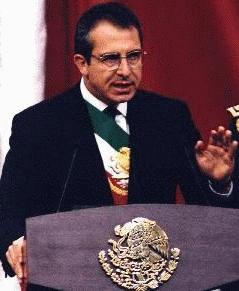Ernesto Zedillo Ponce de Leon (1994-2000)


|
EZPL was born in Mexico City on Dec 27, 1951. He was an Education
Minister for the previous presidente, as well as campaign manager
for the designated successor.
Became candidate when the original candidate, Luis Donaldo Colosio, was assassinated by an alleged plot masterminded within the power echelons of the party. As far as his election, Andres Oppenheimer writes in his book Bordering on Chaos: ``While safeguards against outright fraud made the vote count the cleanest ever, the political process that elected Zedillo and a PRI-controlled Congress in August 1994, was -and is- the most unfair in Latin America except for Cuba's.'' Inherited an economy in shambles, Indian rebellions, and power struggles within the party. His presidential term has been marked by austerity and lack of confidence in his leadership for not clearing important murders and the role of the previous presidente in several noted scandals. become president, at a time when the currency was devalued and the credibility of the government had been so undermined that Zedillo immediately had to face the outbreak of a full-blown national crisis.
However, against all odds, he led Mexico through a dramatic political transformation and helped bring his people democracy and economic stability. As president, Zedillo played a major role in Fox's victory, engineering political reforms that made it possible and going on national television the night of the vote to announce the results and wish the new president well. Often disparaged as a stiff, gray technocrat with little political savvy, Zedillo left his office far more popular than ever. As he handed over the presidency to Fox on Dec. 1, Zedillo was being heralded as an important figure in modern Mexican history, a leader who permitted democracy to blossom. At the end of his term, seven of 10 Mexicans gave Zedillo high approval ratings, compared with only three in 10 in 1995, according to a poll by the national newspaper Reforma. Zedillo also made his office shine by reducing its power. Mexican presidents for most of the last 100 years have run their nation with almost unquestioned authority. But Zedillo systematically stripped himself of many of those powers, also reducing the president's famous discretionary spending account--money that in the past amounted to a political slush fund. The long-term results of his program to strengthen the economy, including an increase in the sales tax from 10 percent to 15 percent that cost him dearly with the public, are now being heralded. |